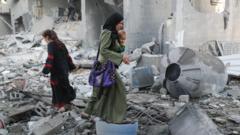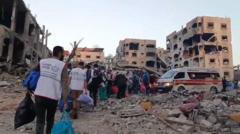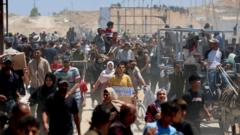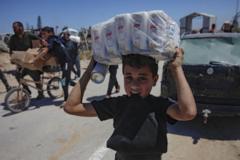With growing international scrutiny, the humanitarian situation in Gaza requires urgent action to prevent further suffering.
**Gaza Faces Dire Humanitarian Crisis as UN Calls for Immediate Aid**

**Gaza Faces Dire Humanitarian Crisis as UN Calls for Immediate Aid**
Top UN officials allege Israel is causing forced starvation in Gaza as tensions escalate.
The United Nations' humanitarian chief has raised alarming concerns over the critical situation in Gaza, stating that Israel's actions are leading to what he describes as forced starvation among the population. In a recent interview with the BBC, Tom Fletcher emphasized that such conditions may constitute a war crime, a point that raises serious implications for international law and accountability. He noted, "Yeah, it is classified as a war crime," underlining the gravity of the situation.
Fletcher's statements come on the heels of Israel's recent actions, where limited humanitarian aid began filtering into Gaza after an extended blockade that lasted nearly three months. This blockade severely restricted essential supplies such as food, medicine, and fuel. Despite the easing of restrictions, aid distribution centers have been overwhelmed, leading to chaos and injuries among those desperate for assistance. The UN has distanced itself from the Gaza Humanitarian Foundation, which has been administering aid, labeling their operations as problematic.
Moreover, Fletcher condemned statements made by Israeli ministers suggesting that mass displacement of Gazans might be acceptable. He urged the Israeli Prime Minister, Benjamin Netanyahu, to reject such rhetoric, asserting that it violates international humanitarian principles. The international community, including leaders from the UK, France, and Canada, has increasingly called for Israel to halt military operations and allow unimpeded humanitarian access.
Fletcher has come under fire for his earlier claim that 14,000 babies could die without urgent aid. Despite the backlash, he reaffirmed his commitment to advocating for humanitarian intervention, stating, “I’m not going to stop speaking up for the need to save these lives in Gaza.” This urgency is compounded by the ongoing violence, with Israel resuming military operations following a brief ceasefire as part of its campaign against Hamas.
The scale of the crisis has reached staggering proportions, with reports indicating over 54,000 fatalities in Gaza since hostilities escalated. As Fletcher pointed out, careful and precise communication is essential when addressing the realities on the ground to avoid further misinformation. With crises also unfolding in Ukraine, Sudan, and Syria, he acknowledges the complexities facing humanitarian efforts and the urgent need for a coordinated response.
As the international community watches closely, the hope remains that decisive actions will be taken to alleviate the dire humanitarian crisis and ensure the protection of civilians caught in conflict. The full implications of this ongoing situation will continue to develop, highlighting the necessity for immediate humanitarian assistance and a renewed focus on negotiations for lasting peace.
Fletcher's statements come on the heels of Israel's recent actions, where limited humanitarian aid began filtering into Gaza after an extended blockade that lasted nearly three months. This blockade severely restricted essential supplies such as food, medicine, and fuel. Despite the easing of restrictions, aid distribution centers have been overwhelmed, leading to chaos and injuries among those desperate for assistance. The UN has distanced itself from the Gaza Humanitarian Foundation, which has been administering aid, labeling their operations as problematic.
Moreover, Fletcher condemned statements made by Israeli ministers suggesting that mass displacement of Gazans might be acceptable. He urged the Israeli Prime Minister, Benjamin Netanyahu, to reject such rhetoric, asserting that it violates international humanitarian principles. The international community, including leaders from the UK, France, and Canada, has increasingly called for Israel to halt military operations and allow unimpeded humanitarian access.
Fletcher has come under fire for his earlier claim that 14,000 babies could die without urgent aid. Despite the backlash, he reaffirmed his commitment to advocating for humanitarian intervention, stating, “I’m not going to stop speaking up for the need to save these lives in Gaza.” This urgency is compounded by the ongoing violence, with Israel resuming military operations following a brief ceasefire as part of its campaign against Hamas.
The scale of the crisis has reached staggering proportions, with reports indicating over 54,000 fatalities in Gaza since hostilities escalated. As Fletcher pointed out, careful and precise communication is essential when addressing the realities on the ground to avoid further misinformation. With crises also unfolding in Ukraine, Sudan, and Syria, he acknowledges the complexities facing humanitarian efforts and the urgent need for a coordinated response.
As the international community watches closely, the hope remains that decisive actions will be taken to alleviate the dire humanitarian crisis and ensure the protection of civilians caught in conflict. The full implications of this ongoing situation will continue to develop, highlighting the necessity for immediate humanitarian assistance and a renewed focus on negotiations for lasting peace.





















